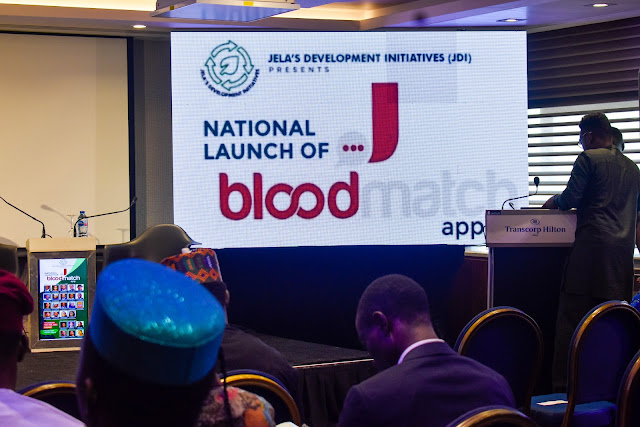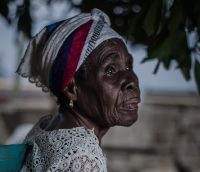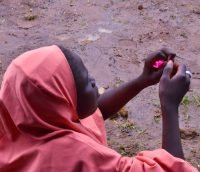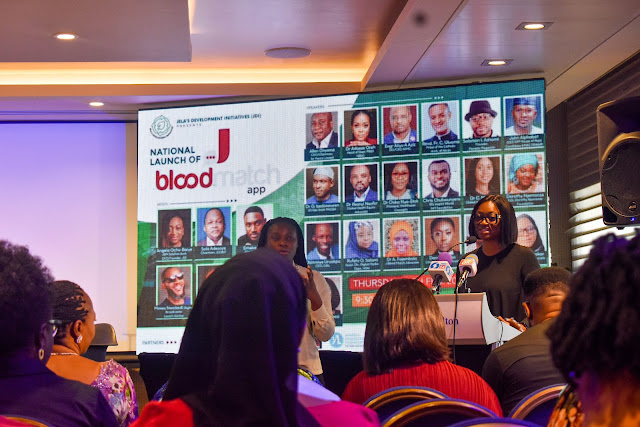
by Cynthia Umeh and Nkem Nwachukwu
Jela’s Development Initiatives (JDI) launched the J Blood Match App, an artificial intelligence application that connects voluntary blood donors to recipients using their blood type and location, on February 9, 2023.
The app allows registered blood donors to request for another blood donor to come to the aid of a recipient in the hospital. It requires you to register on the artificial intelligence application on Telegram or Facebook Messenger by following the prompts. Afterwards, you will begin to receive requests, have the opportunity to accept them and donate blood at a registered hospital.
The launch was held at the Transcorp Hilton Hotel. There were representatives from the National Identity Management Commission (NIMC), the Nigeria Police, the Nigeria Security and Civil Defence Corps (NSCDC), the National Blood Service Commission, Shades of Us and other organisations.

While presenting the welcome address, Angela Ochu-Baiye, the CEO of JDI, shared why she came up with the idea to create a database for blood donors. “The app connects blood donors using their blood type and their location and currently has 952 users in the country.”
Dr Adaeze Oreh, the Head of Department, Planning, Research and Statistics, at the National Blood Service Commision expounded on the gap in the demand and supply of safe blood in Nigeria. She commended the JDI for using technology to drive the importance of blood donation in Nigeria. Similarly, a goodwill message from Aliyu Abubakar Aziz, the Director General of the National Identity Management Commission, focused on the importance of data to blood transfusion management.
Mr John Alphabet, a Nigerian vying for elective office, connected the interrelationship between model health technology and politics and governance. And the manager of Africa Independent Television (AIT) presented a speech on the value of the media in driving social change and shaping the perception of people to become more amenable to donating blood wherever they are.
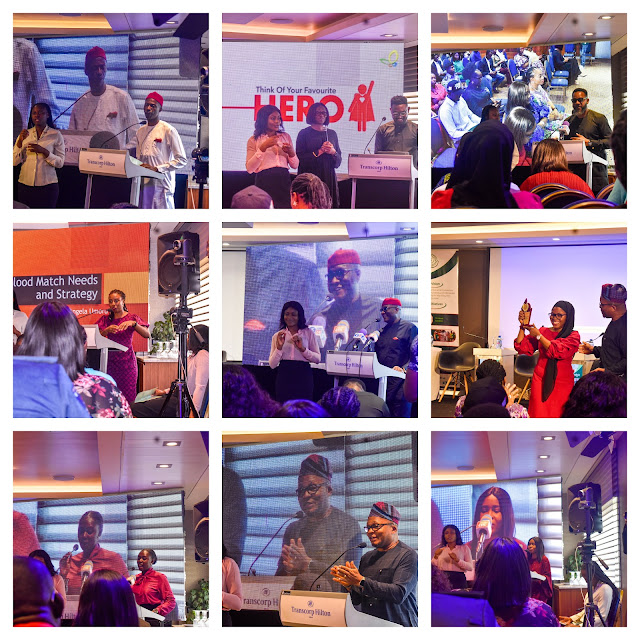
Following the speeches were statements of lived experiences from individuals who have benefited from using the J Blood Match App. There were combined experiences from both blood donors and blood recipients. One of the recipients who received blood over twenty years ago also has a son who is autistic, has Attention-Deficit/Hyperactivity Disorder (ADHD) and other health challenges because he couldn’t receive blood when he needed it. The next lived experience was from an advocate from South Africa who joined virtually. Most of the lived experiences are from the J Blood March advocacy programme. The advocacy programme was created to train individuals who go out and teach people on blood donation, clear up any myths and help people become blood donors. This was what helped them build a database of over 900 blood donors across the country.
Allen Onyema, the Chairman of AirPeace, gave a keynote address that emphasized making the blood transfusion processes and systems easily accessible and devoid of myths that hinder the life-saving attributes of blood donation.
JDI received partnership support in terms of airtime from AIT and advertisement on all flights of AirPeace to advertise the J Blood Match Initiative.
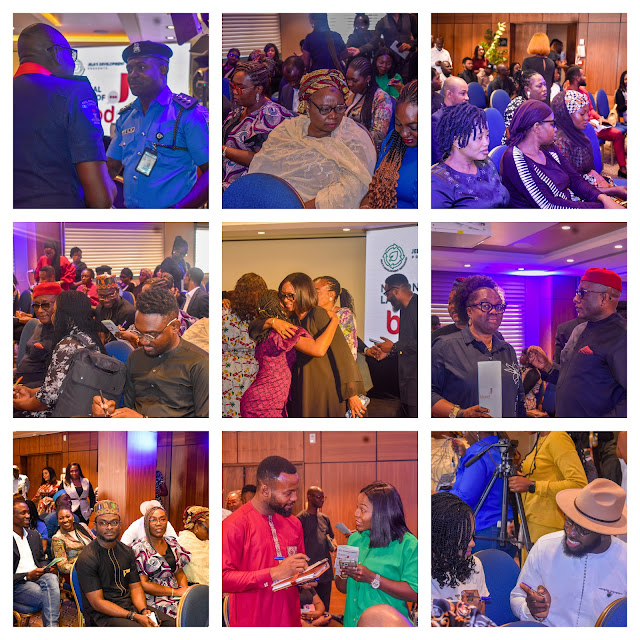
Solomon Izang Ashoms proposed promoting J Blood Match as an innovation for export. From available statistics, 7 million Africans require blood donations daily. This is a huge number of lives that needs to be saved and everyone has a responsibility to become advocates for safe and easy access to blood.
Beyond health, safety, business and politics, blood donations are also moral, as Reverend Father Chinenye Oluoma from the Catholic Archdiocese of Abuja explained. He spoke about blood donation as a pious and charitable act. He noted that blood donation is an act of justice that leads to the prevention of deaths and upholding the sanctity of life. He also offered a media partnership to the J Blood Match on Radio Maria Abuja.
There was a panel discussion that focused on opportunities for blood donation and lessons to be taken from such advocacy initiatives. Panelists emphasised that the best way to drive advocacy is to make the learning process easy and minimize, as much as possible, the use of technical terms that may confuse individuals. The advocacy chain which is made up of the message, messenger and the medium must always be recognized by stakeholders in the advocacy process. The need for health equity was also noted.
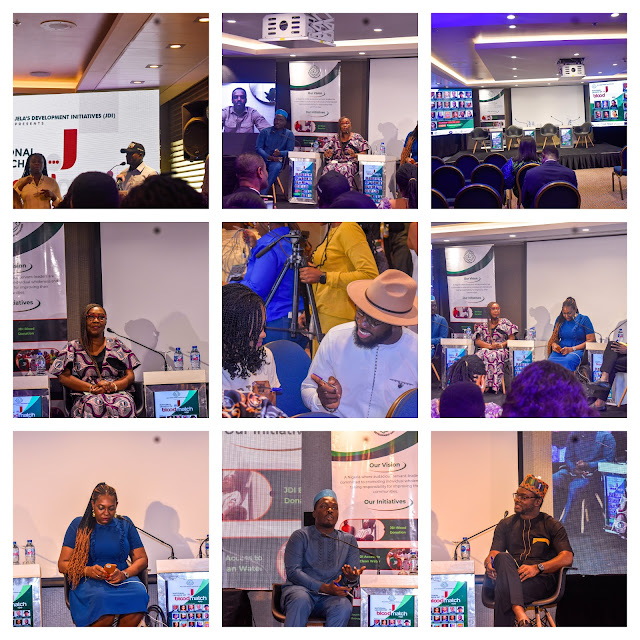
Recommendations from the panel session:
Communication messaging needs to factor in accessibility of people living with disabilities and health facilities should be disability compliant. The glossary of disability should me made to aid persons living with disability
Government also has a role to play in ensuring that fees for screening blood are waived, especially for victims of gender based violence. This would help such victims have easier access to safe blood transfusion
The importance of storytelling in the blood advocacy drive was also emphasised.
Shades of Us believes that the launch of the J Blood Match is a crucial step to addressing some of the problems associated with blood donations in Nigeria: especially during surgeries and emergencies. The organization urges the government to adopt this application into its health systems. There is a room for technology funders to scale up the technology so everyone across the thirty six States and 774 local governments of Nigeria. There is also an opportunity to scale this up across Africa. The time to do this is now.
Learn more about the app here, sign up and share with your family and friends. Donating blood is saving lives.
